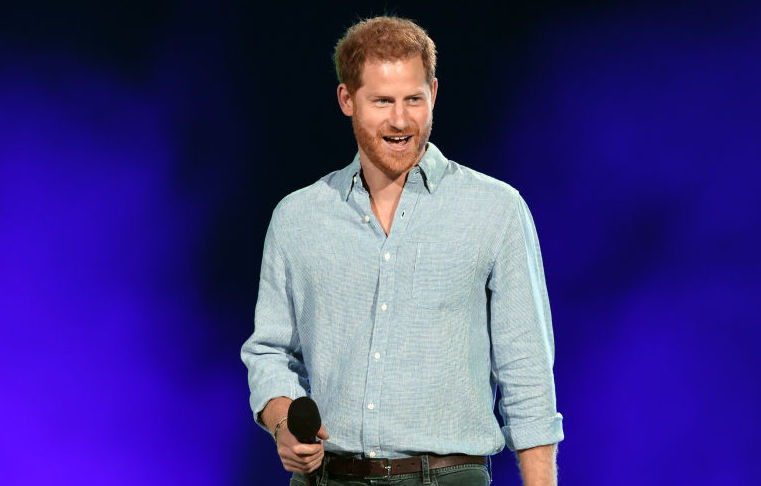Has Prince Harry ever had a thought and not made it public? Are there feelings or emotions he has experienced but kept to himself? The latest episode of The Me You Can’t See, the Duke’s documentary series exploring mental health and emotional well-being, aired this week. Loyal viewers were rewarded with a bonus ‘town hall conversation’ show in which Harry and his co-host and producer, Oprah Winfrey, were reunited with advisors and participants from the series.
The premise of the programmes, drummed home once again in the town hall special, is that having ‘a me we can’t see’ is bad for our mental health. Full emotional disclosure is open, honest, liberating, brave and true. Keeping our feelings to ourselves, on the other hand, is dishonest, repressed, unhealthy and, most likely, dangerous. If this is the Prince’s guiding philosophy, he certainly walks the talk. We are all by now familiar with Harry’s unresolved grief, his ‘genetic pain’ and his youthful ‘self-medicating’ with alcohol, as well as every twist and turn of his decision to break away from the Royal Family and start a new life in California.
Harry unwittingly exposes the zeitgeist and helps us clarify what’s troubling about the times we live in
For Harry, the boundaries between therapist’s couch and television studio are completely erased. In one episode of The Me You Can’t See, he is filmed undergoing an ‘eye movement desensitization and reprocessing’ therapy session. Given how much Harry has already revealed, this week’s releases offer little new. In the ‘town hall’ show, he talks with Robin Williams’s son Zak about the pain of losing a parent who’s in the public eye, ‘you see so many people around the world grieving for someone they feel as though they knew better than you did, in a weird way because you’re unable to grieve yourself.’
Harry alludes to his own difficulties and adds to his criticisms of his family, when he discusses the ‘shame’ people still feel when talking about mental health problems. This echoes his claims, aired in the latest documentary episode, that families hide their struggles from close relatives, even when everyone is aware that there are problems. The Duke said: ‘As parents, and as siblings, there’s an element of shame that we feel because we’re like … “How could we not have seen it?” But we all know that when people are suffering or when people are struggling, we’re all incredibly good at covering it up for those that know we are covering it up.’
It is all too easy to mock the privileged Prince who likes to bang on about his struggles for a fee. We can laugh at the hypocrisy of the privacy-loving Duke whose favourite topic of conversation is his own personal life. But, as so often with Harry, he unwittingly exposes the zeitgeist and helps us clarify what’s troubling about the times we live in. And there is something that should concern us about Harry and Oprah’s push for openness. Certainly stigma around mental health difficulties is dangerous if it stops those who need it from seeking professional help. But must the opposite of stigma be the boundary-less individual who, in exposing all, is left without a private, interior world? Revealing every intimate detail of our lives brings its own pressures. Complete transparency both robs personal relationships of significance and makes it more difficult to separate ourselves off from the lives of others.
In this week’s ‘town hall’ discussion, Harry talks about dealing with his wife’s suicidal feelings – a fact Meghan disclosed in the couple’s first public outing with Oprah. This time around he told Winfrey: ‘I’m somewhat ashamed of the way that I dealt with it. Because of the system that we were in and the responsibilities and the duties that we had, we had a quick cuddle and then we had to get changed to jump in a convoy with a police escort and drive to the Royal Albert Hall for a charity event.’
Harry’s intentions are no doubt good. He advises: ‘But what you [want] to say is “You’re there”. Listen, because listening and being part of that conversation is without doubt the best first step that you can take.’ But in going public with the idea that suicidal individuals can have a ‘quick cuddle’ before pulling themselves together and glamming up for a gig at the Royal Albert Hall, the pair risk trivialising the contemplation of suicide.
Indeed, ‘The Me You Can’t See’ series utterly fails to distinguish between mental health and mental illness. Mental health, as the fashionable meme has it, is something we all have. Mental illness is most definitely not. Mental health can be improved with a walk on the beach, a bubble bath or a quick cuddle. Mental illness cannot. In the town hall show, Harry and Oprah try to counteract some of these criticisms. They are joined by a team of mental health experts and discuss the need for better funding for mental health provision and the need for healthcare reform. But the pop psychology mantras of openness and self-care remain.
Princess Diana famously wanted to be ‘a queen of people’s hearts’ but her son seems determined to become Prince of our feelings. It’s enough to make me nostalgic for the stiff upper lip.






Comments